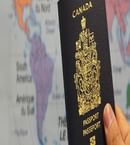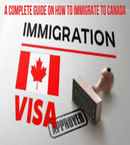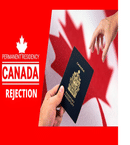According to the latest report of IRCC, the number of international students holding a Candian student visa was 621,565 in 2021. In 5 years from 2015 to 2021, the number almost doubled from 352,330. From India alone, around 230,000 applications have been submitted in 2022 for Canada study permit.
A rise in applications has resulted in a surplus of Canada student visa rejections. As of September 2022, the Canadian student visa rejection rate is 60% for many of the Indian states. This is way above the average Canada visa refusal rate of 30%. Most of these rejections are based on some common reasons like financial insufficiency, program and university of choice, unavailability of permanent residence among various others.

Reasons for Rejection of Canadian Student Visa
International students seeking a Canadian student visa fulfilling all the minimum criteria for admissions are usually optimistic about the decision. It is, however, observed that a study permit may be refused even when the applicant fulfills academic and admission requirements for an institution. Some of the popular reasons for rejection of study visa by IRCC are listed below:
Financial Insufficiency
Proof of funds is a very crucial requirement for studying in Canada. The rules need to have adequate funds for the first year of the course/program. If the immigration officer suspects financial insufficiency, the visa application will get rejected. Find out how much can it cost to studying and living in Canada. Planning ahead of your expenses can totally cover your grounds.
Choice of Program
If the visa officer questions the choice of a program opted by the applicants, your Canadian student visa may get rejected. In cases where the chosen program does not align with the applicant’s academic or employment background, the chances of visa rejection are increased.
Letter of Acceptance
A letter of acceptance from a Canadian DLI is required for applying for the study permit. If the applicant’s acceptance letter is in question, the Canada student visa may be rejected. Along with the letter of acceptance, the applicants are required to meet the minimum entry requirements for the specific institution. If the visa officer doubts whether the minimum requirements are met by the applicant, the student visa may be rejected.
English Language Proficiency
Proof of satisfying the minimum IELTS score for Canada student visa requirement is mandatory for non-English speaking international students. Whether you are applying through SDS or SPP program, proof of English language proficiency is a must.
No Permanent Stay
A Canadian study visa is a temporary permit and comes with an expiry date. International students while giving visa interviews are required to convince the officer that they will return back to their home country after education. However, if the officer feels that a student is a potential immigrant, then a student visa can be rejected.
Incomplete Travel or Identity Documents
In cases where there are too many blank spaces in the travel history with a lack of proof of supporting evidence to cover those periods, the study permit may be rejected. If the identity documents are incomplete or are not easy to read, the chances of Canadian student visa rejection are accelerated.
Applicants must ensure that their travel history is justified with sufficient evidence and documents. The identity documents provided must be clear and easily readable for ensuring that the visa is not rejected because of the above-mentioned reason.
Intent of Return to Home Country
As the study permit is a temporary visa, it has a validity period. The applicants are required to submit enough proof of intent to return to their home country. This does not suggest that the applicant cannot extend their study visa or obtain a PR. It is mandatory to provide documents suggesting the intent of return to ensure that the applicant will not stay in Canada after the expiration of the study permit.
Applicants can address this concern with a detailed personal statement. Applicants must also understand the dual intent concept when addressing the concern in their personal statement. Dual intent accounts for the applicants who initially want to temporarily visit Canada (on a study or work visa) and intend to become permanent residents of the country.
Lack of Job Prospects in Home Country
The lack of job prospects in the home country is an indication of the intent to return to the home country. Applicants who do not have a job offer in the home country or lack job prospects may conclude applicants intend to settle in Canada. This may result in the rejection of the Canadian student visa. Also Check: Jobs in Canada!
Applicants can provide documents and statements suggesting that there are sufficient employment aspects in their home country after completion of the studies in Canada.
Biometric Rejections
If a student fails to upload any kind of biometric requirement or the biometrics are not rightly scanned then Canadian Ambassy has the whole right to reject. Students are advised to upload right and on-time biometrics for a smoother process of VISA approval.
Rejections Due to Covid-19
Due to the prevailing Covid-19 pandemic, Canadian flights from India have been banned for a long time now. Approximately 3,00,000 students with a backlog are applying for the VISA. Due to the higher demand for student accommodation in Canada, Canadian Embassy is rejecting students with poor scores in English Language tests and financial independence. This is done to filter better students for education in Canada and students with poor education profiles can improve.
Tip to Avoid Canada Student Visa Rejection
Now, that some of the common reasons for visa refusal are known, here are a few valuable tips to avoid refusal of a student visa in the first place.
- Make a checklist of mandatory documents required to submit in order to obtain a study visa. A listing of the same is given on the official website of the Government of Canada.
- Carefully and completely fill out the visa form. Make sure that no column blank is left blank.
- Students also have to upload a copy of the offer letter that they have received from a recognized college or university in Canada.
- If applying under SPP, the applicant must be able to show proof of finances, it is advised to obtain a Guaranteed Investment Certificate by transferring CAD $10, 200 to Scotia Bank. Indian students can also get GIC from ICICI Bank.
- If the applicant has work experience, salary slips or bank statements are to be submitted as proof of the same.
- Mention all travel histories and visa rejections (if any) in the visa file.
- Answer all the questions asked on the CIC website while applying online.
- The statement of intent is the most important write-up which will introduce the applicant to the visa officer. Mention the academic achievements and the intent to study in Canada. This statement of intent can break or make the file.
What to do if Student Visa is Rejected?
Reapplying After Rejection of Canada Student visa
Applicants whose study permit for Canada is rejected can appeal against the refusal. The are three ways for proceeding with appealing against the visa refusal. These are requesting reevaluation, appealing against the decision in federal court, and submission of a new application.
If the applicant is applying for a Canadian student visa for the first time, it is advised to take help from a well-experienced visa counselor. Professional visa counselors can help in editing the statement of intent and creating a strong profile.
International applicants who apply for the study permit must ensure that their documents, IELTS/TOEFL scores, and other requirements are met. In case of rejection of Candian Student Visa, though filing a judicial appeal is an impartial assessment but it is a cumbersome process. Students prefer filing a new application for the study permit.
![University of Toronto [U of T]](https://static.zollege.in/public/college_data/images/studyabroad/logos/college_104_25-12:44_University_of_Toronto-logo-2417C8AF32-seeklogo.jpeg?tr=w-50,h-50,c-force?tr=h-40,w-35,c-force)
![The University of British Columbia [Ubc]](https://static.zollege.in/public/college_data/images/studyabroad/logos/college_64_25-11:13_Capture.jpeg?tr=w-50,h-50,c-force?tr=h-40,w-35,c-force)
![McGill University [Mcgill]](https://static.zollege.in/public/college_data/images/studyabroad/logos/college_39_24-17:26_macgill.jpeg?tr=w-50,h-50,c-force?tr=h-40,w-35,c-force)
![University of Montreal [U de M]](https://static.zollege.in/public/college_data/images/studyabroad/logos/college_71_24-17:54_udem.jpeg?tr=w-50,h-50,c-force?tr=h-40,w-35,c-force)
![Simon Fraser University [Sfu]](https://static.zollege.in/public/college_data/images/studyabroad/logos/college_54_25-11:01_Capture.jpeg?tr=w-50,h-50,c-force?tr=h-40,w-35,c-force)
![University of Alberta [UAlberta]](https://static.zollege.in/public/college_data/images/studyabroad/logos/college_9_24-17:46_alberta-.jpeg?tr=w-50,h-50,c-force?tr=h-40,w-35,c-force)












